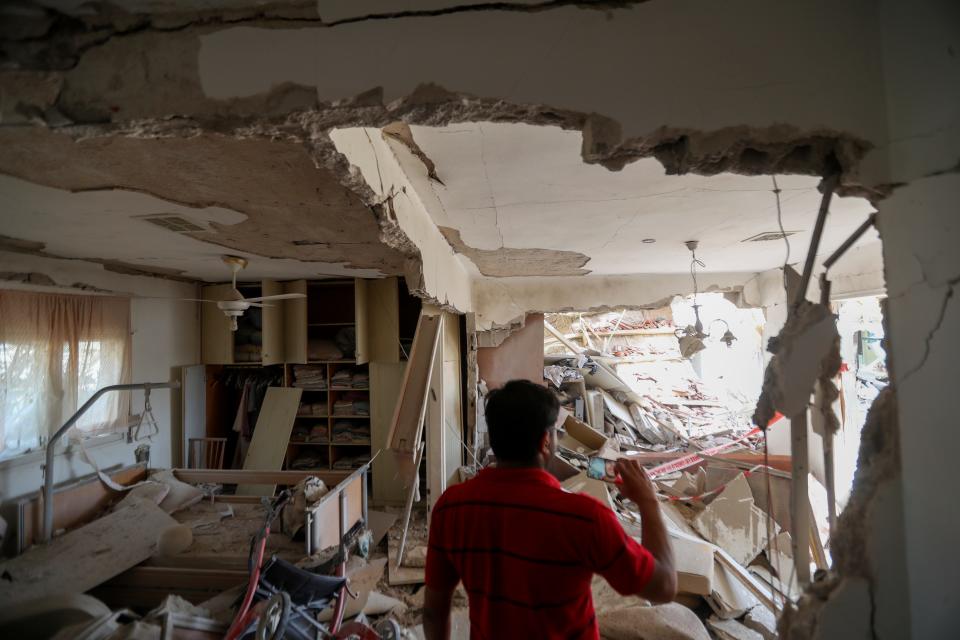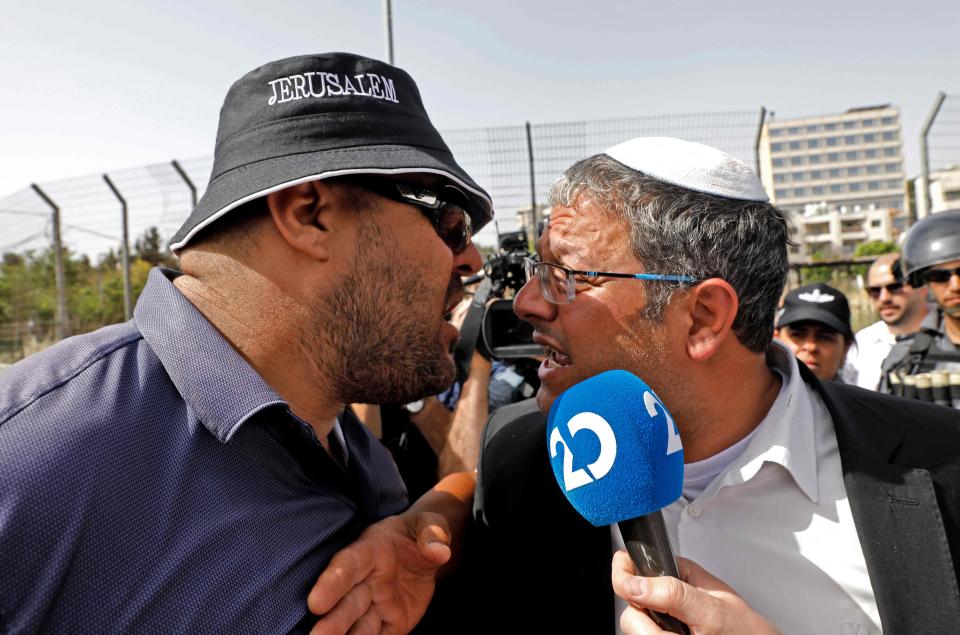What to know about the Israel, Hamas escalation as Biden faces pressure on Palestinian rights
WASHINGTON – At the heart of the deadly clashes between Hamas militants and Israeli security forces is a legal fight over property. But not just any property, or just any landowners.
It revolves around a group of Palestinian families who face eviction from their homes in Sheikh Jarrah, an Arab neighborhood in East Jerusalem, amid property claims by Jewish settlers. The court battle has reignited decades-old tensions and sparked a dangerous military confrontation.
The violence is reverberating in Washington, where the Biden administration is under pressure from some Democrats and human rights advocates to condemn Israel's treatment of the Palestinians, particularly its settlement polices that have squeezed Palestinians' shrinking territory.
"We continue to provide the Israeli government with over $3 billion in military aid every year – with no conditions or accountability for wanton human rights abuses and continuing illegal seizures of Palestinian land," Rep. Ilhan Omar, D-Minn., said in a joint statement Monday with two other House Democrats.
Here's a look at the latest from the contested region, the root of the current crisis and what it means for President Joe Biden.
Happening now: Hamas rocket attacks, Israeli airstrikes
Over the past 24 hours, Palestinian militants in Gaza have launched hundreds of rockets into Israel, and the Israeli military has carried out a stream of airstrikes targeting what it says are Hamas' military installations.
Since sundown Monday, 28 Palestinians – including 10 children and a woman – were killed in Gaza, most of them by Israeli airstrikes, health officials told The Associated Press. The Israeli military said at least 16 of the dead were militants. Three Israeli women were killed in Hamas strikes in Ashkelon and Tel Aviv. More than 700 Palestinians were hurt in clashes with Israeli security forces in Jerusalem and across the West Bank.

Israeli Prime Minister Benjamin Netanyahu said terrorist organizations in Gaza "crossed a red line" when they launched missiles toward Jerusalem. He warned that the fighting could “continue for some time.”
The leader of Hamas, a U.S.-designated terrorist group that controls Gaza, said it would would continue its rocket attacks until Israel stops “all scenes of terrorism and aggression in Jerusalem and Al-Aqsa mosque.”
Jon B. Alterman, director of the Middle East program at the Center for Strategic and International Studies (CSIS), noted that the tensions come at a time of “simultaneous political crises” in Israel and the Palestinian territories.
Netanyahu recently failed to assemble a governing coalition after the fourth round of elections in Israel. “He is potentially facing the end of his political career, and he lacks a popular mandate,” Alterman said in a Q&A published by CSIS on Tuesday. “Meanwhile, Palestinian president Mahmoud Abbas just canceled legislative elections, which would have been the first held since 2006, after his party was trailing badly in the polls.”
How we got here: What to know about Sheikh Jarrah
Israeli-Palestinian tensions have been spiraling for weeks, spurred in large part by the legal battle over Palestinian homes in Sheikh Jarrah.
Israel captured East Jerusalem in the war of 1967, and the government views Jerusalem as one unified city. But the international community has long rejected Israel's annexation, and the Palestinians claim East Jerusalem as their territory and want it to be their capital in a future Palestinian state.

Sheikh Jarrah fell under Jordanian occupation after the first Arab-Israeli war in 1948, and the neighborhood was "repopulated by the Jordanian government and the United Nations with Palestinian refugees," according to Evan Gottesman, associate director of policy and communications at the Israel Policy Forum, which is focused on building support in the U.S. for a two-state solution.
Sheikh Jarrah has become a flashpoint now because Israeli settlers say Jews owned land in that neighborhood before Israel’s creation, and they're fighting in court to regain control. Israeli law allows Jews to reclaim such lands but bars Palestinians from recovering property they lost in the same war, even if they still reside in areas controlled by Israel.
In 1956, 28 Palestinian families settled in the neighborhood after being expelled from other Arab towns, according to an account in Middle East Eye, a digital news outlet covering the Middle East and North Africa. About 40 Palestinian families now live in Sheikh Jarrah, and about seven of those face eviction.
The families’ plight ignited protests and clashes, which then escalated.
Biden administration wants Israeli-Palestinian tensions to cool
The Biden administration has recalibrated Middle East policy after four years in which former President Donald Trump's staunchly favored Israel and shunned the Palestinians. The White House has resumed some humanitarian aid to Palestinian refugees, among other steps.
On Tuesday, White House press secretary Jen Psaki said Biden has been briefed daily on the developments. She said he has directed his advisers to engage “intensively with senior Israeli and Palestinian officials, as well as leaders throughout the Middle East."
As the eviction dispute heated up, Secretary of State Antony Blinken called on both sides to deescalate tensions and stop the violence.
"It is absolutely critical that all sides exercise restraint," Blinken said in a statement Friday. He also expressed concern about the looming evictions in Sheikh Jarrah and other neighborhoods, noting that many of the Palestinian families have lived in those homes for generations.
"As we have consistently said, it is critical to avoid steps that exacerbate tensions or take us farther away from peace. This includes evictions in East Jerusalem, settlement activity, home demolitions, and acts of terrorism," Blinken said.
But as the violence escalated, the State Department's chief spokesman Ned Price on Monday called Hamas' rocket attacks an "unacceptable escalation" and praised Israel's decision to reroute an annual parade held to commemorate Israel's capture of East Jerusalem.
"The United States condemns in the strongest terms the barrage of rocket attacks fired into Israel in recent hours," Price said at the State Department regular briefing. "While we urge de-escalation on all sides, we also recognize Israel’s legitimate right to defend itself and to defend its people and its territory."
Alterman said the Biden administration is “deeply sympathetic to Israel” but also very aware that the conflict could prove explosive.
“While the instinct will be to keep the conflict at arm’s length, that calculus could change quickly after a week or so,” he said.
Progressives pressure Biden on Palestinian human rights
Some Democrats and advocates say the White House should be more engaged in reducing tensions and should push back more aggressively against Israel's settlement policies.
"This conflict demands bold, proactive and continuous diplomatic engagement from the Biden administration and the international community," the left-leaning Jewish advocacy group J Street said in a statement Monday.
The group called on the Biden administration "to make clear publicly that Israeli efforts to evict and displace Palestinian families in East Jerusalem and the West Bank are completely unacceptable to the United States, as is the continued use of intimidation and violent, excessive force against Palestinian protesters and worshipers – especially during Ramadan."

Progressives in Congress have also called for a more forceful response from the White House.
"For decades, we have paid lip service to a Palestinian state, while land seizures, settlement expansion, and forced displacement continue, making a future home for Palestinians more and more out of reach," Omar said in the statement, joined by Democratic Reps. André Carson of Indiana and Rashida Tlaib of Michigan.
"It is long past time we finally take action to protect Palestinian human rights and save lives," the lawmakers said.
Republicans, however, are applauding Democrat Andrew Yang, who ran for president in 2020 and is running for mayor of New York City, who tweeted that he is "standing with the people of Israel."
Sen. Marco Rubio, R.-Fla., also voiced support for Israel, saying, "If America or any country was seeing rockets rain down on their cities, what response would be expected?"
Contributing: The Associated Press
This article originally appeared on USA TODAY: Israel, Hamas conflict grows as Biden faces pressure on Palestinians

